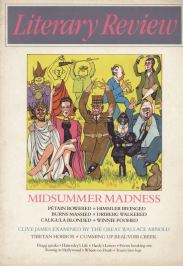Jad Adams
Time Out Of Mind
Empires of Time – Calendars, Clocks and Cultures
By Anthony Aveni
I B Tauris 371pp £16.95
The Nuer compute time according to male maturity rites, whether events happen before or after the last incision ceremony.The Mayan calendar started at the time the rains came, then ran for 260 days – a human gestation period. The Trobriand islanders set their clocks by the palolo worm. When it comes to the surface of the water and gyrates, thereby loosing its genital products into the Pacific, that is the time the planting month starts. They have measured out their lives in worm ejaculate.
Anthony Aveni’s book is full of such information about the way cultures mould concepts of time and the concepts maintain the integrity of the cultures. The moral of the tale is that when humans talk of time they are relating to social values rather than to an eternal verity about man’s relationship with the infinite. This may be somewhat predictable from a Professor of Astronomy and Anthropology, but the proof of it is so rich and varied that it compensates for any lack of novelty.
He opens with the biological basis of time measurement. Even in hermetically sealed containers, under constant temperature and light, oysters and fruit-flies know the time of day. Could our measurement of time be similarly pre-ordained by our biology? It has been suggested that the seven-day week may be determined by

Sign Up to our newsletter
Receive free articles, highlights from the archive, news, details of prizes, and much more.@Lit_Review
Follow Literary Review on Twitter
Twitter Feed
How to ruin a film - a short guide by @TWHodgkinson:
Thomas W Hodgkinson - There Was No Sorcerer
Thomas W Hodgkinson: There Was No Sorcerer - Box Office Poison: Hollywood’s Story in a Century of Flops by Tim Robey
literaryreview.co.uk
How to ruin a film - a short guide by @TWHodgkinson:
Thomas W Hodgkinson - There Was No Sorcerer
Thomas W Hodgkinson: There Was No Sorcerer - Box Office Poison: Hollywood’s Story in a Century of Flops by Tim Robey
literaryreview.co.uk
Give the gift that lasts all year with a subscription to Literary Review. Save up to 35% on the cover price when you visit us at https://literaryreview.co.uk/subscribe and enter the code 'XMAS24'